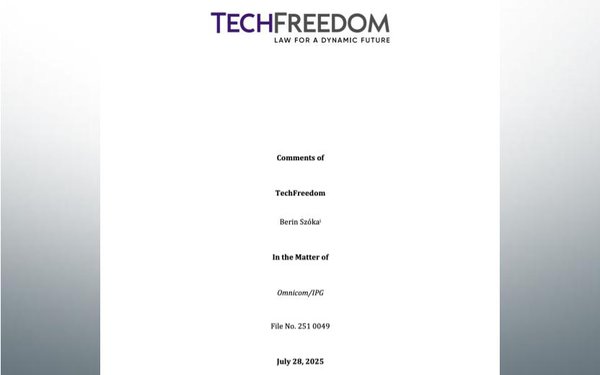
Free speech
advocates are criticizing a Federal Trade Commission proposed consent decree allowing Omnicom Group's merger with Interpublic, but requiring the company to refrain from directing ad dollars based on a
publisher's political or ideological views.
"The consent decree raises grave First Amendment problems," the think tank TechFreedom says in comments filed this week with the agency.
The group adds that the FTC is wrongly
"leveraging its regulatory power to compel companies to support or avoid certain kinds of speech."
The watchdog Public Knowledge added in separate comments that the FTC's
approach "reflects adoption of a false narrative: that advertisers conspire with social media platforms and others to systematically 'censor' conservative voices."
advertisement
advertisement
"This claim
distorts standard business practices designed by advertisers to avoid brand association with toxic content as evidence of pervasive ideological bias," the group writes. "The notion that advertising
placement decisions constitute systematic political censorship lacks empirical foundation."
Public Knowledge adds that the consent decree is "constitutionally flawed."
"Every decision
about where to place advertising, whether based on brand safety, audience demographics, content quality, or even political considerations, is a form of protected expression under the First Amendment,"
Public Knowledge writes.
"Whether an agency avoids a platform due to concerns about extremist content, low-quality journalism, inappropriate audience demographics, or technical
performance issues, each choice represents an editorial judgment about the appropriate context for the client's message," the group adds. "The government may not condition merger approval on the
surrender of this editorial discretion."
FTC Chair Andrew Ferguson argues the consent decree will mitigate concerns that advertisers will collude to deprive publishers of ad
revenue based on ideology.
"In recent years, the advertising industry has been plagued by deliberate, coordinated efforts to steer ad revenue away from certain news
organizations, media outlets, and social media networks," Ferguson stated last month, when the
FTC unveiled the consent decree.
He added that allegations in the House Judiciary Committee's report regarding the now-defunct Global Alliance for Responsible Media (GARM), if
true, "paint a troubling picture of a history of coordination -- that the group sought to marshal its members into collective boycotts to destroy publishers of content of which they disapproved." That
report accused the brand safety group of coordinating action by corporations, ad agencies and other industry groups in order to “demonetize platforms, podcasts, news outlets, and other content
deemed disfavored by GARM and its members.”
But critics say antitrust concerns don't justify the FTC's proposed restrictions.
"The Commission may
believe it is targeting anticompetitive collusion, but it risks chilling legitimate, and protected, editorial judgments by private actors," TechFreedom writes. "If there is any ambiguity about the
line between permissible antitrust enforcement and unconstitutional speech regulation, the Commission should err on the side of caution."
The FTC's proposed order specifically
would prohibit Omnicom/IPG from using "exclusion lists" (or "other means of differentiating between publishers") based on political or ideological views, unless those lists are developed "at the
express direction of a particular client."
That restriction would require advertisers "to take on roles related to brand safety
that agencies have traditionally helped manage," Public Knowledge says.
TechFreedom notes that prior FTC leaders rejected calls to police
political speech. For instance, former FTC Chair Joe Simon told Congress in 2020 that the agency was not empowered to regulate political speech, and former chair Timothy Muris in 2004 rejected a
complaint against Fox News by advocacy group MoveOn.org, which had asked the agency to investigate whether the company dupes the public with the slogan “fair and balanced."
Muris stated at the time: "There is no way
to evaluate this petition without evaluating the content of the news at issue. That is a task the First Amendment leaves to the American people, not a government agency."